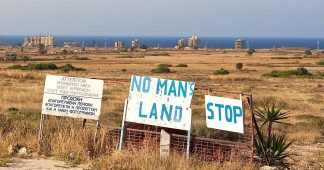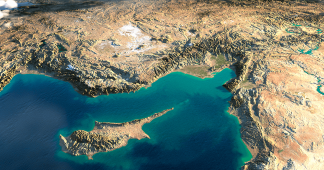By William Mallinson
Athens, 7 September 2023
Former British Foreign Secretary Jack Straw has again come out with a plea for a two-state solution for Cyprus.[1] This alleged Left-winger, who lied his way through the Iraq enquiry, was involved in extraordinary renditions and torture, and later in a shady political lobbying affair, boasting to two undercover journalists that he ‘operated under the radar’, and had used his influence to change EU rules on behalf of a firm which paid him £60,000 a year. Given that the Turkish government uses various PR and lobbying companies, one is inclined to wonder why he has been wheeled out to be interviewed. Is he being paid? And does it mean yet another desperate attempt to foist on the people of Cyprus another pseudo-solution, which would consign the island to a NATO-controlled pro-Turkish semi-state?
Straw pleads for partition and recognition of the Turkish Cypriots as a state, which would finally represent the victory of brute force over international law (although he does not dare to say this), claiming that only this will bring the dispute between Turkish and Greek Cypriots to an end. To support this argument, he claims that every attempt to come to a solution has been thwarted by the Greek Cypriots. In fact, the opposite is the case, as a reading of the Foreign Office files show. Indeed, a senior FCO official wrote that the Greeks wanted a legal settlement, the Turks a political one. For ‘political’, we can read ‘outside the law’. Straw thus shows both his bias and his ignorance. Perhaps he should read the following FCO post-invasion (1975) quotes:
But the Turkish side is in effect saying that the 1960 constitution is defunct. They are, of course, freely having their cake and eating it by applying the view only when it suits them.[2]
In other words the Turks cannot rely on the collapse of the Constitution in order to justify intervention for the purpose of re-establishing the state of affairs by the basic Articles of the Constitution and, having intervened with that aim, then ignore that aim because the Constitution has lapsed.[3]
In 1976, the British Ambassador to Turkey wrote:
And the Turkish Cypriots, supported by Ankara, have consolidated their hold on the north to an extent that makes them more than ever reluctant to yield anything near the minimum acceptable to the Greek side as a basis for a settlement.[4]
The following year, he wrote:
It is a pity, though perhaps not surprising, that the Turks post-Ataturk have not yet acquired much of the subtler art of compromise among themselves any more than they have in foreign affairs.[5]
Straw again shows his ignorance and bias by implying that Turkey had to invade in 1974 to protect its minority, when the FCO papers show that this minority was not under threat. Moreover, once the putschist ‘president’ Sampson had been overthrown and the Greek junta had fallen, and the status quo ante in Cyprus had been restored, Turkey took over more than one third of the island, using brute force. The events that led to the illegal occupation are still buried in Greek party-political dirt, with the Greek Parliament having passed a law not to allow vital papers to be released. It was in any case the US’s then one-man band Kissinger who allowed Turkey to take over more than a third of the island. Straw appears studiously unaware of the backstage facts, recently well documented.[6] Herewith a vital extract from a telegram from the British High Commissioner to Cyprus, of 18 July 1974, two days before the first Turkish invasion:
I have no (no) evidence of any immediate threat to the Turkish Cypriot community. There have been no attacks on the community during the past few days. The Turkish Cypriot Minister of Defence, Mr Orek confirmed to a member of my staff this morning that the Greek Cypriot Community, and in particular the National Guard, had been behaving with admirable caution: there had been a few minor casualties through bullets straying inadvertently across the Green Line, but in general the Turkish Cypriot Community had no cause for complaint in this respect.[7]
It is thus abundantly clear that Straw is talking through his straw hat. He is an insult to factuality.
As to the argument that partition (which would be illegal under international law, into the bargain) would improve relations between the two communities, it is wishful fantasy. One has only to consider the partition of Ireland and India to understand this, the first almost one hundred years old, the second seventy years old. Well over one million people were slaughtered, and the problem continues today, with Brexit causing a major headache regarding the Republic of Ireland’s border with the London-controlled North, while India and Pakistan continue to quarrel over Kashmir, both countries with nuclear weapons.
The only solution is one based on international law, not on Straw’s ignorant protestations as PR man for the Turkish government.
[1] Interview by Ahmet Gencturk, Anadalou Ajansi, 7 September 2023.
[2] Olver to Goodison, 4 March 1975, letter, NA FCO 9/2159Batstone to Jones, file WSC 1/7, part B, in Mallinson, William, Britain and Cyprus, I.B. Tauris, London and New York, 2011, pp.173-174.
[3] Batstone to Jones, minute, 21 March 1975, ibid., p. 174.
[4] Phillips to Foreign Secretary, despatch, 24 August 1976, NA FCO 9/2376, file WSC 011/7, in Mallinson, William, Partition Through Foreign Aggression, Minnesota Mediterranean and East European Monographs, University of Minnesota, Minneapolis, 2010, p. 35.
[5] Phillips to Foreign Secretary, 23 February 1977, Diplomatic Report No. 156/77, NA FCO 9/2668, file WST 014/1, part A, Mallinson, William, op. cit., Britain and Cyprus, p.177.
[6] See Mallinson, William, Kissinger and the Invasion of Cyprus, Cambridge Scholars Publishing, Newcastle upon Tyne, 2017.
[7] Olver to FCO, telegram, 18 July 1974, NA WO 386/21, file BFNE/1500/24, Annex P, in op. cit. Britain and Cyprus, p. 61.
We remind our readers that publication of articles on our site does not mean that we agree with what is written. Our policy is to publish anything which we consider of interest, so as to assist our readers in forming their opinions. Sometimes we even publish articles with which we totally disagree, since we believe it is important for our readers to be informed on as wide a spectrum of views as possible.











